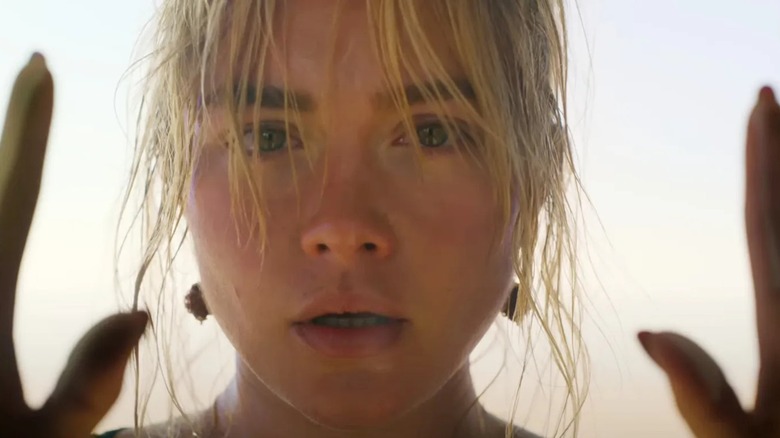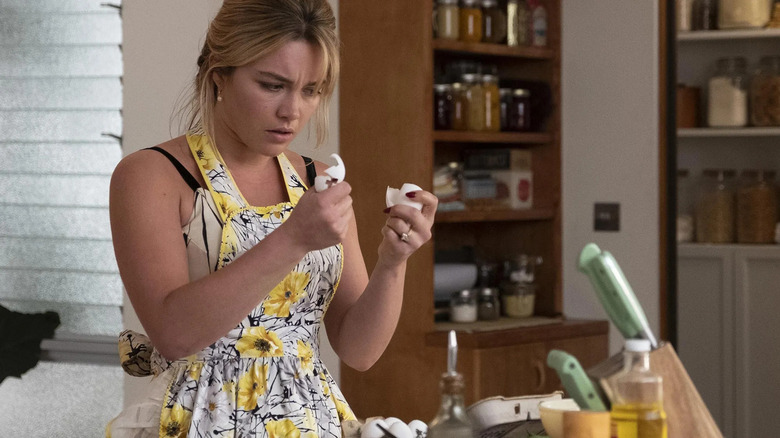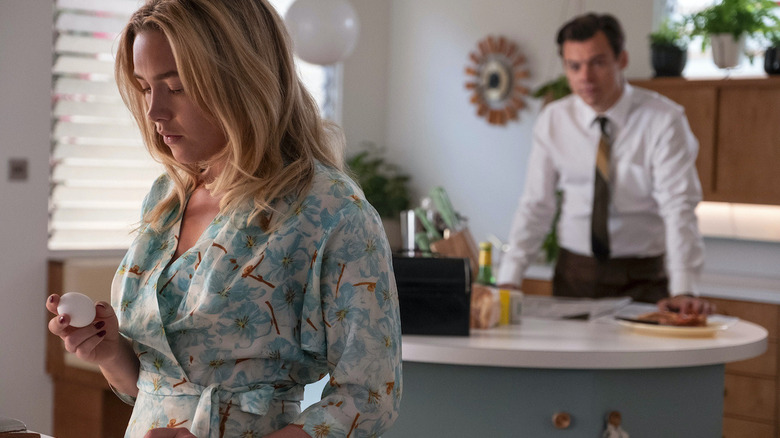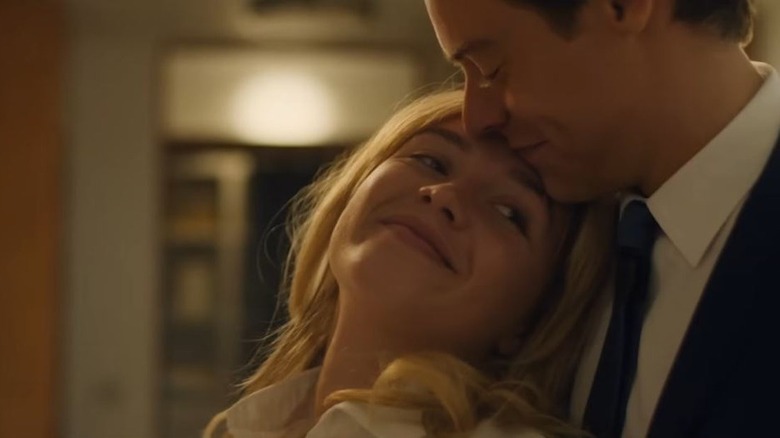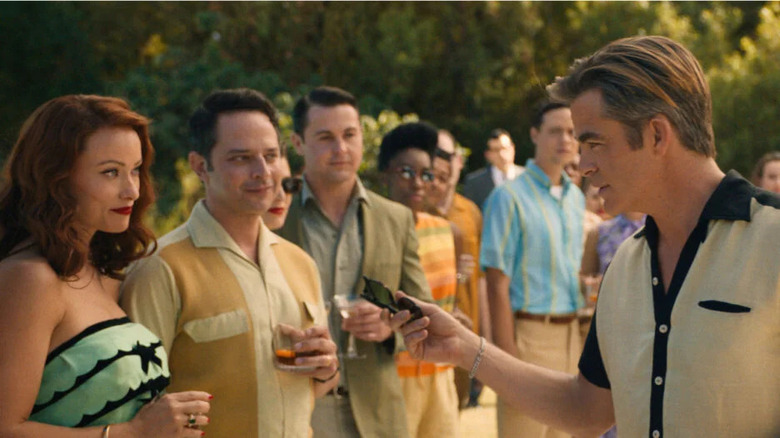Would The Original Ending Of Don't Worry Darling Improve The Movie?
Warning: This article will openly discuss many spoilers about the ending of Olivia Wilde's "Don't Worry Darling."
The original screenplay for "Don't Worry Darling" was written by Carey and Shane Van Dyke, who are grandsons of Dick Van Dyke. Their script was infamously on the 2019 Black List, an annual poll held among screenwriters who vote for the best scripts floating around Hollywood that have not yet been produced. Director Olivia Wilde and one of her "Booksmart" screenwriters Katie Silberman scooped up "Don't Worry Darling," re-wrote it, changed the focus, added several characters, and came out with the strange, psychological thriller currently playing in theaters. Incidentally, the upcoming film "The Menu" was also on the 2019 Black List.
"Don't Worry Darling," set sometime in the 1950s, is about a woman named Alice (Florence Pugh) who lives in a posh industry town called Victory that resembles Palm Springs, CA. Her husband Jack (Harry Styles), along with all the other husbands in town, works at a mysterious building miles outside of the city, and is forbidden from discussing what he does there, other than to say he works on "progressive materials." The town is overseen by the Randian self-appointed messiah figure Frank (Chris Pine) who gives impassioned backyard speeches about owning the world and how Victory is a successful Hegelian experiment of some kind. Alice begins to sense something is amiss about Victory when she witnesses a depressed friend (KiKi Layne) being placated with drugs. She also begins having nightmarish visions, indicating that time is out of joint.
Any time Alice questions Jack or even Frank about the nature of Victory, she is rebuffed or gaslit. Eventually, she will be given shock therapy to keep her quiet.
A second warning: The following paragraph will discuss the ending of "Don't Worry Darling" in detail.
The ending
Eventually, it will be revealed what is happening in "Don't Worry Darling."
When Alice witnesses an airplane crashing in the hill outside of town, leading her to trek out into the desert on foot to investigate. She finds no crash, but the strange, mirrored building where her husband ostensibly works. When she places her hands on it, her mind is wiped and she is mysteriously transported home. This building, it will be revealed, is actually an "exit" from a massive artificial reality that Alice has been forced into. Alice and Jack are, in fact, living in the present day, and Victory is a simulation fed directly into their eyeballs as they lay on a bed in a cramped apartment. Jack has hijacked Alice and forced her into the fake world, as he was unhappy with how much Alice had to work, and how little time they had for one another.
The Victory Project, then, was not an experimental community, but an exclusive experimental program that Jack was permitted to enter. Eventually, inside the simulation, Alice catches wise. She smashes a glass into Jack's head, killing him. Her neighbor Bunny (Wilde) explains that if someone dies in the simulation, they die in real life. Bunny knows that Victory is a simulation, and lives in it willingly, as her children died in the real world, and seem alive on the inside. The movie ends with Alice fleeing back to the "exit" building and leaving the simulation, presumably to shut it down.
In another curious twist, Frank is murdered by his wife Shelley (Gemma Chan) while she claims she is taking over. Shelley's ambition was never previously discussed.
The original ending
The themes of "Don't Worry Darling" are muddled at best. Wilde is making a comment on how men seek to control and cow women, and how said men turn to post-World War II America as an "idyllic" time for them. This kind of deconstruction of 1950s suburbia has been a common theme in movies for decades. See Bob Balaban's 1989 film "Parents" for a glorious example of the subgenre. In Alice's case, the simulation was specifically wielded by Jack to control her. It might have helped, however, had audiences seen more of who Alice and Jack were outside of the simulation.
In a recent article on Insider, details of the screenplay's original ending were revealed, and the Van Dyke version of the screenplay did fill in amore information. It also seems that the original draft was more explicit in its themes.
For one, the character of Frank and his Randian philosophies were inventions by Wilde and Silberman. They also downplayed the roles of the male characters, choosing to make "Don't Worry Darling" a story of the women's experience. The expanded screenplay, it might be argued, was too widely focused.
In the original draft, the exit to the simulation was hidden within a house for sale. When Alice (originally named Evelyn) escaped from the simulation, she gained full consciousness and found herself in the year 2050. She was indeed mentally connected to a complex simulation, but found that she and Jack had actually divorced long ago. She finds from an internet search that the simulation was called "Alt-Life," and it was designed by sexist men specifically to eschew "a world controlled by women." Jack (aka Clifford) faked Evelyn's death and wired her into the machine against her will.
What a twist!
The original ending of "Don't Worry Darling" contained a pile of additional twists, and it may be up to the reader to decide if the original twist endings are more interesting than the final cut of the film.
In 2050, Clifford ends up finding that Evelyn had escaped the simulation. He subdues her and forces her back inside. While inside, Evelyn undergoes shock therapy to erase her memory of her escape. She is seemingly pacified, and goes back to being a happy 1950s housewife, but days later will confront Clifford about her knowledge of "Alt-Life." She'll even threaten to do some pretty aggressive things with a broom handle. Clifford will admit that he chose "Alt-Life" to undo their divorce, brought about by her workaholism. Evelyn will angrily flee the simulation, only to be once again confronted by Clifford in 2050. He'll force her back into the simulation again, where, this time, Evelyn is put into a mental hospital.
In the mental hospital, Evelyn admits that her visions of 2050 were only fantasy. She envisioned a high-tech future where women were treated as badly as they were in the 1950s. There was no simulation. It was all a dream. A dream of a future where women were empowered. That's a pretty damning ending.
Then, in one final twist, Bunny arrives to tell Evelyn that the mental hospital contains another exit portal. Was Evelyn imagining it, or is this a simulation? The original screenplay keeps it ambivalent.
A lack of clarity
Wilde's and Silberman's final version is comparatively hazy when set against the original draft. She retained the themes of a marriage pulled apart by a woman who works too much, but seems to have excised the whiny, entitled misogyny that drives the Jack character. We see his actions, but kind of take for granted why he would be driven to commit such a violation of Alice's mind. In the Van Dyke screenplay, audiences would have seen explicitly that "Clifford" had been radicalized by online life. This would allow for a clearer parallel to modern phenomena like the so-called incel community and websites like 4Chan that openly encourage the most hideously misogynist language imaginable.
Also, Wilde's inclusion of the Frank character only muddies the waters. Frank is clearly meant to read as an L. Ron Hubbard-like cult leader, who preaches that selfish agency and brash dominance over others is the same thing as healing. Perhaps Wilde was attempting to make a comment on America's post-WWII tendency toward Scientology and other self-help based cults, but the cult ultimately plays a small part in Wilde's story, and feels like too much stuffing.
Wilde's style is first rate, and her use of visuals and sound create a truly haunting atmosphere, and her cast is first rate. But her and Silberman's ideas aren't entirely clear, and the screenplay doesn't gather together any themes that emerge as terribly solid. "Don't Worry Darling" is largely unsatisfying. Whether or not the original script would have made for a better film, one can only speculate.
